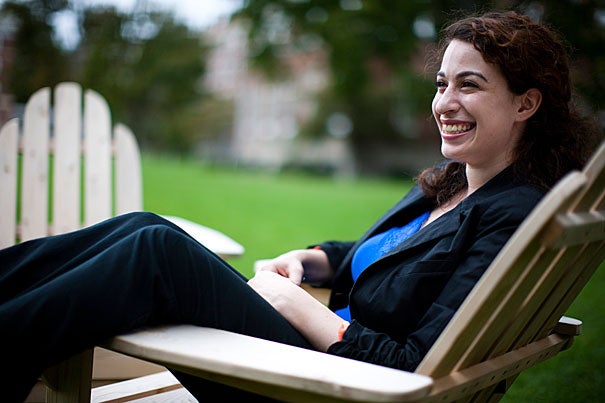
“I chose psychology not only because it fascinated me, but because of its flexibility and applicability to so many life situations,” says psychology concentrator Maya Shwayder ’11. “I now have the ability to analyze rationally, to research calmly, to accept criticism with grace, and to be open minded about other people’s behaviors. I think we can all agree these traits would serve anyone, in any profession, very well.”
Stephanie Mitchell/Harvard Staff Photographer
An education, not a job
Psychology major points out: College is for learning, not training
Upon meeting someone new, our introductory conversation usually goes something like this:
New Person: “So, where are you in school?”
Me (as humbly and nonchalantly as possible): “I go to Harvard.”
New Person: “Harvard? Wow! That’s so great! What are you studying there?”
Me: “Psychology.”
From here, the conversation can go one of two ways, depending on the proximity of New Person’s age to mine. If we are close in age, the next question tends to be the more sensitive of the two, “Do you think you’ll do anything with your major after college?”
If, however, New Person’s age exceeds mine by a multiple of two or more, the question tends to be the more blunt. “What are you going to do with that after college?” is accompanied by a patronizing elevation of bushy gray eyebrows.
Those two questions are unpleasant in different ways. The first query gently acknowledges that while I love psychology, it may not be the single overwhelming passion in my life; it suggests that other career options abound for me, and (perhaps misguidedly) encourages me to gaily prance through the fertile job fields of America, reaping what I may.
The second question not only smacks me in the face with the reminder that I’m still sorting out my life plan, but says I should be forming said plan around the four years I have presumably devoted to dutifully studying pages of “Journal of Cognitive Science” and frantically filling out ethics committee forms. When I inform New Person that I do not plan to pursue psychology after graduation, the next facial expression usually reads, “Well then, why are you wasting your time?”
I have, in fact, filled out my fair share of IRB forms for research. I’ve also worked in a lab, taken fascinating and challenging psychology classes that I loved, and read quite a few articles from various prestigious journals.
But Harvard is neither a technical institution nor a trade school. Walk 15 minutes down Mass. Ave. if you want one of those. We bill ourselves as a liberal arts institution. According to the Merriam-Webster Dictionary, the term “liberal arts” means “college or university studies (as language, philosophy, literature, abstract science) intended to provide chiefly general knowledge and to develop general intellectual capacities (as reason and judgment) as opposed to professional or vocational skills.”
This suggests that my psychology degree is, in fact, not supposed to prepare me for a career specific to psychology. It is instead supposed to endow me with a skill set and heightened mental aptitude with which I may then go forth and apply in the real world. I chose psychology not only because it fascinated me, but because of its flexibility and applicability to so many life situations. I now have the ability to analyze rationally, to research calmly, to accept criticism with grace, and to be open-minded about other people’s behaviors. I think we can all agree these traits would serve anyone, in any profession, very well.
The fact that Harvard is a liberal arts school is also the reason we have programs like General Education, and why students are allowed to take elective classes, not to mention why extracurriculars abound on this campus. I was pleased to be able to “waste my time” on classes like introductory computer science, Dante’s “Divine Comedy,” and the history of Jewish jokes. These classes, along with my stints co-managing the Pforzheimer House Grille and writing for “Let’s Go” travel guides taught me and shaped me just as much as my psychology classes did.
Unless pursuing research or academia, the subject one studies in college often has little to do with the career in which one ends up. But even those who do wish to pursue research and academia are often judged for not studying something “more practical,” such as economics or statistics. What are we supposed to do? We can’t all be accounting majors. A friend who is now working on his Ph.D. in linguistics told me, “I hate that people really don’t seem to understand that college isn’t job training.”
College, especially a place like Harvard, is definitely not job training, and is more than just school; it’s a set of experiences. It’s about acquiring (among other things) a liberal arts education and becoming a well-rounded, interesting person. How many 18- to 22-year-old young adults truly know what they want to do? And among those who do think they know, how many end up in that field? I’d wager the answer to both those questions is “very few.”
I believe I was in fourth grade when I found out it was estimated that our generation was going to have 11 careers in our lives. Not 11 jobs. Eleven careers. And, in all honesty, that’s what my well-rounded psychology degree from my beloved liberal arts institution will be good for. Understanding people, understanding companies, understanding my interviewers, and making it easier to navigate this ever-stupefying society. So I’ll thank you to lower your bushy gray eyebrows and trust that even though the students at Harvard may not know how to draft an invoice, we’re going to do just fine.
If you’re an undergraduate or graduate student and have an essay to share about life at Harvard, please email your ideas to Jim Concannon, the Gazette’s news editor, at Jim_Concannon@harvard.edu.




